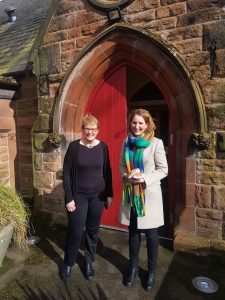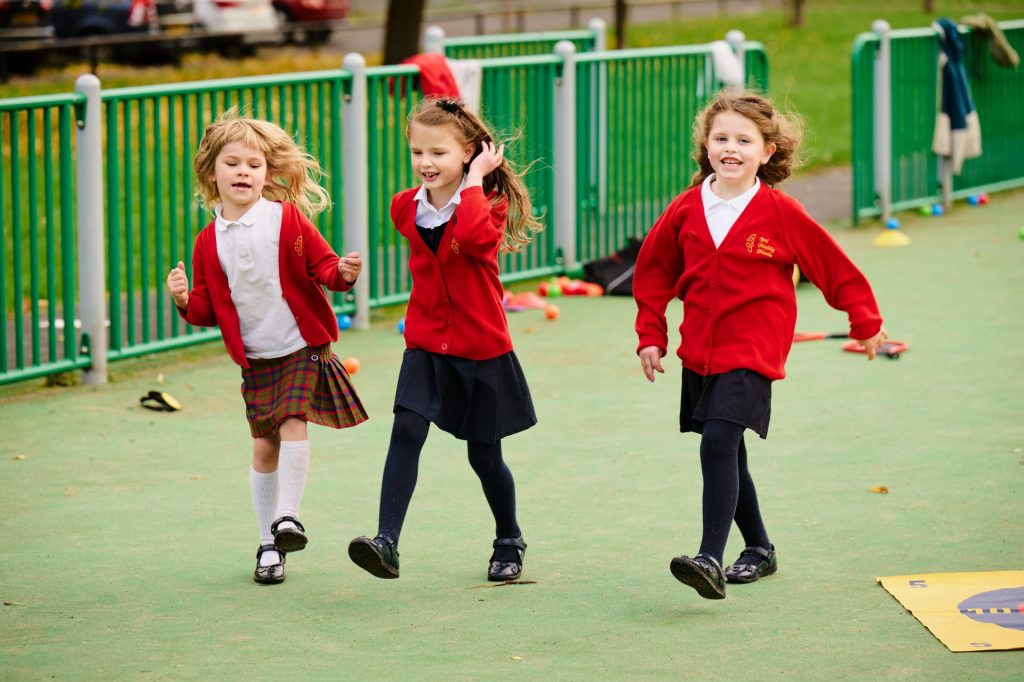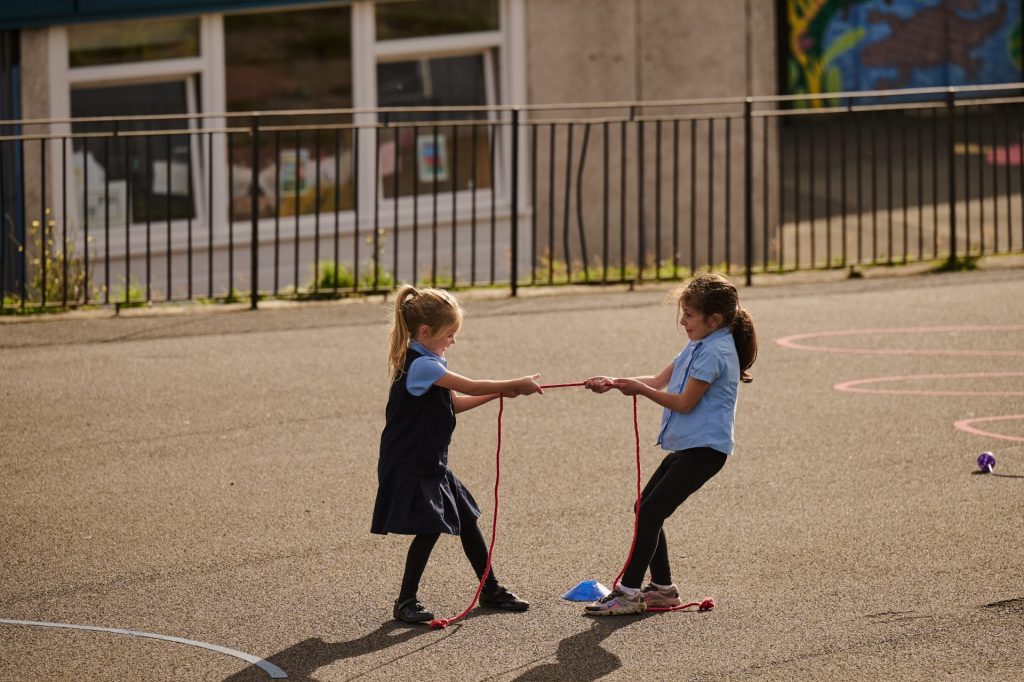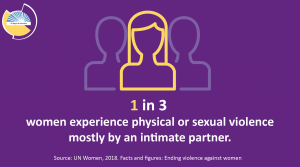Crowdfunder launched to raise £10,000 for children with care experience to create lifelong memories this summer
intandem, Scotland’s national mentoring service for children and young people with care experience, has today (Wednesday 31st May) launched a Crowdfunder campaign, aiming to raise £10,000 to help children create lifelong memories this summer.
All children deserve the opportunity to have fun and try new things to help set them up for a positive future. For children with care experience, the summer holidays may not offer the same opportunity to create these happy memories and they can miss out. Especially as the rising cost of living means many families in Scotland are struggling to stay afloat.
The intandem programme is managed and facilitated by Inspiring Scotland and will match every donation made during the campaign . All money raised will allow mentors and mentees to do something a bit more special during the summer holidays like visiting a zoo or theme park during their weekly meetups.
Julia Abel, Director of Funds at Inspiring Scotland said:
“We all have those memories of during the summer holidays – a trip to the beach, enjoying an ice cream or going someplace new. Those all-important things to talk about on the first day back at school.
“Many children with care experience, especially this year with the rising cost of living, are missing out. We want to go the extra mile and raise money for mentors and mentees to be able to do something a bit more special.
“intandem mentors provide children and young people with a consistent adult role model in their lives who is that one step removed from the day-to-day, who will empower them to be more confident and to feel heard.”
intandem mentoring is a proven model, where mentees have reported increased self-confidence, self-esteem, social relationships and has even seen many children and young people more positively engaged with their local community. Mentors help their mentees set goals and encourage resilience and confidence to succeed in life.
Donations can be made at crowdfunder.co.uk/p/intandem-summer-activities
Inspiring Scotland’s Specialist Volunteer Network (SVN)
For a charitable organisation, having access to a broad range of professional skills can be challenging when resources are already stretched. Whether seeking IT or marketing expertise, financial or legal advice, a trusteeship or practical help, Inspiring Scotland’s Specialist Volunteer Network (SVN) can step in. The Specialist Volunteer Network (SVN) is one of Inspiring Scotland’s unique offering to the sector – providing free support to charities across the country.
In 2021 our Specialist Volunteer Network team supported received over 583 individual requests for support which turned into more than 2000 hours of free support to around 200 charities. This support is valued at over £600,000.
SVN Executive Elaine Crichton leads the team along with SVN and External Engagements Coordinator Tommy Seymour.
With a network of over 500 Specialist Professional Volunteers, Inspiring Scotland provides a free, personalised service to match the skills of a volunteer to the support needs of the charity, creating a relationship that is fruitful for all involved. Being a bespoke, personalised service is what makes the SVN unique. “We could just be running a database,” said Elaine “But that’s how the magic happens, that’s just what we do. People will say ‘I didn’t think you could do that’ or ‘you’ve solved all my problems in one phone call.’
“Whether that’s saving you money, making you feel good, solving a problem that’s been giving you sleepless nights – it’s all of that and more.”
In 2021 the SVN team also launched its second corporate partnership cohort with Edinburgh-based global research and consultancy group Wood Mackenzie with 21 employees signed up to support five charities. Corporate partnerships can help to connect employees with their communities as well as identify transferable skills. According to Elaine “Corporate partnerships can help to connect employees with their communities as well as identify transferable skills. You are giving back and meaningfully contributing to social change.”
One of the charities supported during the year was Comunn Eachdraidh Nis based on the Isle of Lewis. Through SVN, Wood Mackenzie Professional Volunteers supported the organisation to review their business plan taking into consideration the impact of the pandemic and results of a community consultation.
Malcolm Dickson, Research Director with Wood Mackenzie, said:
“Working for these charities has been genuinely inspiring. The dedication of the teams and the scope of what they deliver is incredible.” Another organisation who have received a wide range of Specialist Volunteer support is PEEK, which supports children and young people in the East End of Glasgow. Support provided has been in a wide range of areas such as board governance and training, strategy development, IT training, digital and communications strategies and HR support for pay benchmarking”
Michaela Collins, CEO of PEEK said SVN had given the charity “amazing support”.
“Every request for pro bono support via SVN has been met and exceeded our expectations,PEEK would not be the same charity without unwavering support.”
Looking to the future, Elaine and Tommy want to expand the reach of the network in order to help even more charities to save time and vital funds. They are eager to spread the word about how the SVN can make a difference and see it as being a vital resources in the current cost of living crisis.
Tommy explains: “We have over 500 volunteers on our books and, last year we worked with just over 200 organisations, so immediately there’s more volunteers than support requests.
“Our long term goal is to have every volunteer deployed at some point in the year and, ideally, to be at a stage where we have no volunteers free, and be taking on more volunteers.”
Elaine adds that it is as straightforward as possible for charities to put in service requests:
“It’s as simple as send us an email or give us a call. There’s no form filling.”
There are over 25,000 registered in Scotland, and every one can make a request for assistance. Accessing this professional support can save charities time and money, allowing them to concentrate on frontline services.”
Putting Families at the Centre
On Friday 4th November, the Inspiring Scotland Perinatal and Infant Mental Health (PIMH) team, supported the Scottish Government Perinatal and Early Years Mental Health Policy team with hosting the online event: Families at the Centre.
With over 250 attendees, from across the perinatal and infant mental health sector, the event offered a chance to bring everyone together and highlight just some of the work that has been achieved throughout the lifespan of the Perinatal and Infant Mental Health Programme Board and wider remit. It is a passionate and committed sector, and it was a privilege to bring people together to share the inspiring work that has been carried out.
Couldn’t make the event? Here’s what you missed:
- Dr Roch Cantwell from the Perinatal Mental Health Network launched the new Scottish Perinatal Mental Health Care Pathways videos. These videos aim to help women, their infants and families to access the most appropriate specialist perinatal and infant mental health care, should they require it.
- Dr Hannah Guzinska (Home -Start Scotland), Leanne Jack and Natalie Shinwari (Home-Start East Highland) shared the important and far-reaching work of Home-Start Scotland. You can contact Hannah by email: hguzinska_assoc@home-start.org.uk. There is also lots of information on the Home-Start Scotland website.
- Christina Smiley shared the incredible work of CrossReach Counselling Scotland. CrossReach currently delivers perinatal counselling services across three locations: Bluebell Perinatal Service based in central Glasgow, Perinatal East based in central Edinburgh and Moray Perinatal based in Buckie. Clients are parents expecting a baby or with a child under three, facing perinatal mental health challenges.
To find out more about the Glasgow service email: bluebell@crossreach.org.uk; to contact the Moray service email: counselling@crossreach.org.uk; and to contact the Edinburgh based service email: pnd@crossreach.org.uk
If you are interested in partnering with CrossReach to develop a perinatal hub in your area, please get in touch with Christina Smiley, on Christina.Smiley@CrossReach.org.uk or on mob: 07388990187
- Leanne from Inspiring Scotland shared the Directory of Perinatal Services which is a list of organisations across Scotland who currently offer perinatal and infant mental health support. To add or amend your service email us: PIMHenquiries@inspiringscotland.org
- Kat Masterson and Rach Barlee, Participation Officers from Parent and Infant Mental Health Scotland spoke via video about the importance of lived experience at the centre of services. If you would like more information about their work, they are both happy to be contacted: Kathryn.Masterson@maternalmentalhealthscotland.org.uk; rach.barlee@pimhs.org.uk
- Louise Christie from the Scottish Recovery Network shared the Peer Recovery Hub, which has lots of free peer support resources. You can hear more information about peer support and what it means to individuals by exploring their Peer Support and Me webpage. Scottish Recovery Network are keen to hear from peer support organisations across Scotland to help to build a new perinatal mental health peer support resource. If you have any questions or would like to be involved, you can get in touch by emailing info@scottishrecovery.net
- Kaylie Allen from Inspiring Scotland and Rosie Kennedy from Nurture the Borders, shared with us the first look at the Peer Support Evaluation toolkit. The toolkit has been designed to help peer support services to evaluate their services. If you offer peer support and would be interested in reviewing the toolkit in more detail and giving your feedback, please email: PIMHenquiries@inspiringscotland.org.uk
- Evaluation Support Scotland helped to develop this evaluation toolkit; they work with third sector organisations to help with measuring and reporting on their impact. They have lots of free resources available on their
- Dr Anne McFadyen and Vicky Armstrong discussed the importance of the voice of the infant and how to take account of babies point of view. They have recommended some links that you may be interested in: The UNCRC’s paper on early years; WAIMH Position Paper on the Rights of Infants; and the Parent Club web page ‘Guide to Wellbeing for Wee Ones’ . Both Anne and Vicky are happy to be contacted should you want to get in touch: Anne.Mcfadyen@gov.scot and v.g.armstrong@dundee.ac.uk
A huge thank you to all the speakers that gave up their time to share their work and thank you to everyone who attended the Families at the Centre Event.
If you would like to share how you keep families at the centre of your work, we would love to hear from you. Please tag us on twitter @PIMHFund and use the hashtag #FamiliesAtTheCentre
Empowering women and girls through Active Play
To mark this year’s Scottish Women and Girls Sports week we want to highlight the positive impact of women and girls’ participation in sports and physical activity through the Active Play Programme. Using a partnership approach it is enabling children, and adults, to participate in, and in turn lead on Active Play across Glasgow and the rural Highlands.
It is clear that taking part in outdoor play, regular sports, or physical activity is good for individuals and communities.
However, despite this, nearly 60% of girls don’t meet the recommended exercise guidelines. Research from Women in Sport shows that at the age of nine, many girls have already been put off sport and over 40% of girls have dropped out of all sports activity by the time they reach their teenage years. We must change this.
We believe that Active Play can be part of the solution to this national problem.
Active Play combines grassroots delivery of inclusive active play, with training and support, so that children have access to more fun and inclusive active play and adults can understand the principles of Active Play and be confident in implementing it. The more adults who are able to continue to facilitate active play, the more active play for children.
Since 2016 Inspiring Scotland has have worked in partnership with Glasgow City Council to deliver Active Play to 5,000 children in 147 primary schools and this year will bring the programme to the Highlands in 3 primary schools, benefitting around 360 children.
Active Play is typically delivered over a 15-week period for 1 hour per week with 30 mins of structured active play led by a trained charity leader and 30 mins of outdoor free play activity. The sessions can take place in a school, nursery, or community setting. And the approach is underpinned by three drivers: Fun, Active and Inclusive.
Bringing the fun back into physical activity can be a huge incentive for engaging women and girls in sport. The team of partners collaborating on the programme also understand the importance of involving the children, and those who care for them in a way that promotes confidence, leadership, and ownership – boosting motivation and physical competence.
The Active Play programme is backed by evidence from a PHD doctorate, internal and external evaluations. We know it is building children’s resilience, confidence, and self-esteem. Data has also shown children have improved relationships, physical ability, negotiating skills, energy levels/stamina, confidence, and happiness all being improved.
Teaching staff are also recognising the benefits with many continuing to deliver Active Play after the programme has ended. Feedback has also suggested that physical activity/literacy levels have been further enhanced by 74% children taking up/planning to take up new sports clubs or activities after school. In addition to 80% participating in more active play at breaks and lunchtime, or at home.
The Value of Partnerships
The Active Play programme would not be possible without the expertise, knowledge, and resource from a range of partners.
Actify lead on the CPD training of all adults involved in the programme and provide a centralised place for learning and sharing of best practice. Check out the Active Play hub here: https://actify.org.uk/activeplay
Having professional play experts leading Active Play on a weekly basis is crucial to the success of the programme. These positive and trusted role models bring their expertise, cooperative working practices and shared learning and is enhanced by the ongoing CPD delivered by Actify. Additionally, the play charities provide a bridge between communities/families and schools; providing wraparound support to the most vulnerable children across Glasgow.
Inspiring Scotland’s role has been central to the ongoing strategic development of Active Play. From inception to now, working closely with Glasgow City Council Education Department, PEPASS, teachers, schools, and other stakeholders across the country and the grassroots charities to ensure a joined up and complementary approach.
If we value the health and well-being of girls, and all children and want to create a future of young people and adults who enjoy being physically active then we must continue to work together to remove barriers. We can provide more and better active play, physical activity and sporting opportunities which are fun, active, and inclusive and become a fundamental part of growing up in Scotland.
 For more information on the Active Play programme please feel free to drop me a line Melodie Crumlin, Thrive Outdoors Fund Manager melodie@inspiringscotland.org.uk or follow on Twitter @Melodie_Crumlin
For more information on the Active Play programme please feel free to drop me a line Melodie Crumlin, Thrive Outdoors Fund Manager melodie@inspiringscotland.org.uk or follow on Twitter @Melodie_Crumlin
Supporting the South of Scotland Enterprise Additional Support Needs (ASN) Learning Network
 Sally Cavers shares some insight into the work she has been leading with South of Scotland Enterprise bringing people together as a collective to learn and share and create positive change.
Sally Cavers shares some insight into the work she has been leading with South of Scotland Enterprise bringing people together as a collective to learn and share and create positive change.
Background to the Network
The Additional Support Needs (ASN) Learning Network grew from a joint concept between The Usual Place of Dumfries and Borders Additional Needs Group (BANG) in the Scottish Borders, two organisations that work with people with additional support needs in the South of Scotland.
It was created out of a desire to support knowledge and awareness of good practice and to make connections to improve the employment opportunities for people with additional support needs. Founding members had experienced great work across the region but difficulty in knowing what opportunities are available in employment for people with additional support needs and how these opportunities can be better supported. It is funded by the South of Scotland Enterprise (SOSE) and facilitated by Inspiring Scotland.
The ASN Learning Network helps to share best practice and innovation in employment for people with additional support needs in the South of Scotland region. Collectively network members identify where gaps are in service provision and co-develop solutions which will help to inform the regional economic strategy. Economic recovery is a priority area for SOSE and by funding this work it demonstrates our commitment to Fair Work and Equalities which are vital planks in our strategy. It is key we develop our skills and people in the region and to make sure that we create and sustain new jobs that are fulfilling, well rewarded and secure. The ASN Learning Network will provide the connections and analysis to make this a reality.
Kathy Cremin, Communities Specialist, South of Scotland Enterprise
About the Network
The network is made up of almost 40 individuals from local and national third sector organisations, local authority teams, school staff, Skills Development Scotland, and others. Members meet every two months to explore key areas of focus, look at good practice examples and decide how to progress things that hamper improvement. Members are committed to contributing to change for people locally that sees an inclusive approach to work in the region. The Network was established in October 2021 and is a two-year pilot.
We need the network to help us all to harness the full potential of individuals across the South of Scotland and supports places across the Borders and Dumfries and Galloway that enable people with additional support needs to thrive. Young people with additional support needs have the right to contribute to a society that recognises and provides opportunities for their participation in the labour market. The network is making the connections and enabling the conversations that will make this happen.
Heather Hall, Director Inspired Community Education Trust
What has happened so far?
Our work initially focused on creating connections across the areas, facilitating meaningful discussion primarily through network sessions.
The network sessions include spotlights highlighting good practice, this has showcased organisations and projects that members were not aware of. The Scottish Borders is one of the 10 local authorities that is trialling the Principles of Good Transitions: Principles into Practice approach developed by ARC Scotland. Members learned about how to improve young people’s experience of preparing to leave school and were given insight into the tools developed that they will be using as the model rolls out.
The first feedback report summarised network members’ contributions to discussions about what was needed locally and what would make a difference. Members had discussed the barriers to progress for different age groups and the report summarised these for readers. This provides a baseline for evidence of success as the network develops throughout its test period.
Participation is really deepening my understanding of the connections we need to make for change.
Network member
Part of Inspiring Scotland’s role is to amplify the views and experiences of people with additional support needs in relation to employment. At Inspiring Scotland we place lived experience at the centre of our work and want to engage with people who experience challenges most directly. We can do this by listening and designing services in partnership with those they serve.
A session with a Borders youth group provided the opportunity for creative engagement and young members to share what would make a difference for them. This evidence will be used to further support the case for change. The network is amplifying the views and experiences of people with additional support needs in relation to employment.
One of the specific blocks raised by several members and people consulted as a barrier to employment for people with additional support needs across the region was transport.
A young person with additional support needs sharing their views about employment locally said there is a need for more opportunities – not just saying “no” – even for volunteering and more job opportunities that can be done remotely, so people are not limited if they can’t get around. Funding needs to be available for travel.
The network enables sharing of solutions between cross sectoral members who do not usually have this opportunity and can share ideas for example on funding for transport.
As the network approaches it’s one year anniversary in October, Sally and the team are looking forward to continuing this work with South of Scotland Enterprise. 
If you are interested in this area of work, contact, Sally Cavers, sally@inspiringscotland.org.uk
You can stay up to date with the work of the the network:
Marking 16 days of activism
Today marks the beginning of 16 Days of Activism against Gender-Based Violence. 16 days is an annual international campaign which starts on the 25 November, the International Day for the Elimination of Violence against Women, and runs until 10 December, Human Rights Day.
Inspiring Scotland are Programme manager of Delivering Equally Safe, the Scottish Government’s funding programme which supports third sector organisations and public bodies contribute to the objectives, priorities and outcomes of the Equally Safe Strategy. We recognise the importance of local and community led support when it comes to tackling this issue, with 16 days of activism providing a key opportunity for communities to come together and raise awareness in whatever way they can.
It has been agreed that the 2021 theme for the National VAW Network and partners will be ‘Light Up’. The theme of ‘light up’ aims to place a spotlight on the issue of Violence Against Women and Girls(VAWG) whilst encouraging people to get involved using awareness raising and community-led activities. So today we are highlighting some of the many events happening across Scotland over the next 16 days for anyone who wishes to support, raise awareness of or simply educate themselves more on the issue of gender based violence.
- Perth and Kinross Violence Against Women Partnership shared the 2021 programme of events to mark #16days across Perth and Kinross. Everything from films, discussions and the showing of ‘Consent’ to students at Perth College feature in the event programme.
- Glasgow Women’s Aid launch their campaign today in which 16 organisations across Glasgow have signed up to host their QR code posters – once scanned they lead to animations challenging misconceptions surrounding domestic abuse.
- Scottish Borders Rape Crisis Centre is hosting : Reclaim The Night – Candlelight Vigil – Thursday 25th November -6pm – Hawick.
- The candlelight vigil is being held to remember the women who have lost their lives to Gender Based Violence and honour all the women who have survived.
- Every year, the Dundee Violence Against Women Partnership (DVAWP) works closely together to deliver a number of awareness raising events as part of this campaign. All of the events are open to all members of the public and communities within Dundee – no one is excluded – this is everyone’s issue!
- Young Women Rise is a young women’s advisory leading on partnership work between Scottish Women’s Aid and YWCA Scotland – The Young Women’s Movement. They are hosting an event on young women, healthy relationships and domestic abuse.
- There will be a debate in Scottish Parliament happening on the 25th November on Violence Against Women and Girls, to coincide with the start of 16 Days of Action (running between 14.55 and 17.00) Watch it live.
The above is simply a snapshot of the many events happening across Scotland, you can view a more in depth calendar of events from The Improvement Service.
The slogan #WhatWillYouDo for #16Days is a call to action for people to get involved and commit to action, whether this be people individually or collectively by leadership and from “civic Scotland”.
So with that in mind what can you do?
- Further reading on 16 days of activism.
- Download the 16 days of activism toolkit.
- Utilise social media to raise awareness by using the hashtags #LightUp #WhatWillYouDo.
The world needs people who think differently
In our latest blog, Autism Performance Advisor Allison Crawford writes about the development of the Different Minds. One Scotland campaign and the collaborative process which helped bring the campaign into fruition.
(more…)People are at the heart of sustainable charities
All charities have the people they serve at the heart of everything they do, writes Performance Advisor Kirsty Gilchrist. It is a core principle of our sector.
But people are also at the heart of how they do it. Without the energy, compassion and expertise of staff, charities could not do the extraordinary work they do for Scotland’s people and communities. To enable staff to channel that energy, organisations need to be able to operate from a position of strength and sustainability.
Over more than 10 years of funding and working alongside Scotland’s charities and social enterprises, we have identified our top five essentials for charity sustainability. They are not surprising; neither is it surprising that they rely on people.
# 1 Funding and strong financial management
You need the right level of funding to support people and the right level of income to sustain your operations over the long term, but income alone isn’t enough. Charities need to monitor their finances regularly to ensure sustainability. Realistic budget projections, understanding your cash position and, ideally, monthly management information are the best way to monitor your organisational financial health. A lot of this can be captured simply but charities can, and should, reach out if they need help.
# 2 Good governance
Good governance is the foundation of an effective charity – and, again, is predicated on the strengths of people. A good board means strong, accountable leadership that can build a culture of success. It also means a range of expertise to help navigate the many challenges that charities face. Having someone on the board with financial experience is as important as someone who can represent the voices of those you support.
#3 A Strong Strategy
To be effective, charities and social enterprises need to know what they want to do and how they want to do it. Without a vision which sets out your aims and a strategy which identifies the steps for getting there, organisations cannot hope to achieve their aims. The best strategies have a simple, clear direction, putting the people that the charity serves at the heart of their objectives. But charities also must to identify the resources they need to implement their plans. That means a strong fundraising strategy to help them attract funding, but it also means the right people with the right skills.
#4 Understanding the difference you make
It’s crucial that charities evaluate their impact and understand the difference they are making. Monitoring your impact helps you to ensure what you do is working and to develop the way your organisation addresses the changing needs of the people you serve. It also gives you the evidence you need to demonstrate the impact of the work you do. It allows you to build trust with funders and investors by telling the stories of the people you support and the impact their investment is having.
#5 Strong networks and partnerships
Charities cannot succeed alone. Networks and partnerships with all sectors – and the people who work there – are essential. Our colleagues in the public, private and academic sectors, as well as others in the third sector, have a depth of experience and expertise. Building collaborative relationships is essential to help charities be more effective. People, wherever they may work, are our best resource in the fight against inequalities.
Find out more about we could help you
This article originally appeared in Third Force News: Guide to Running a Charity 2019
The Journey to Charity Director
By Christopher Graham, Vice Chair of Stepping Stones for Families & CEO of The Marketing Department
I write this at a time of change for the Stepping Stones for Families (SSfF) board. We are preparing for our AGM in a few weeks, the final one for our outgoing chair. And my fellow board members will not be surprised to hear that at our January board meeting I will be standing for chair.
I’ve been on the board for a few years and my journey to becoming a board member of this great organisation started, I suspect, a tad unusually.
For nearly thirty years, SSfF had worked alongside children, young people and families to give them support, opportunities and a voice in tackling the effects of poverty and disadvantage in their lives. Yet, despite nearly three decades spent transforming lives, the work of the organisation was practically invisible outside of the sector. With the 30th anniversary of the charity’s founding fast approaching, the staff wanted to mark the occasion and celebrate what they and countless people they had supported had achieved.
Inspiring Scotland was working with SSfF to deliver family play programmes and wanted to help it tell its story.
As well as running a creative agency full time, I had been working with Inspiring Scotland since 2016 offering my services to charities they worked with as a Specialist Volunteer.
I met with Isobel Lawson, SSfF Chief Executive, on this basis to work on some ideas for how the organisation could improve its website and social media to better tell its story.
That conversation rapidly evolved into a complete rebrand. The reason for this is what we could see the website wasn’t fit for the mobile era, and worse still, the organisation’s visual style wasn’t fit for the digital area and caused confusion about what the charity did.
My colleagues and I at The Marketing Department worked closely with Isobel and her team to execute the rebrand over six months. It was the largest we had ever executed at that time. As part of our process to understand the work of the charity, and how this new brand had to be deployed, we visited many of the charity’s centres and childcare centres.
What struck me at every site was how dedicated everyone was. Every single person from top to bottom. I’d ever encountered such an organisation, in the private, public or third sectors. During the rebrand process, Isobel had mentioned her desire to recruit board members.
As the process was drawing to a close, I realised I wasn’t looking forward to it. The launch of the new brand, website and social media strategy would mean an end to working together.… or would it? Isobel and I had developed a strong working relationship and I had learnt so much about the work of SSfF and the Scottish third sector from her. So, I approached Isobel about the possibility of joining the board. She was happy to say that she had was going to ask me to consider joining once the rebrand was complete anyway!
I wanted to join because I enjoyed the work and I wanted to keep helping once the rebrand was finished. It’s really important that boards of charities have a diverse skill set that meets the needs of the organisation. In this case, I contribute my marketing, communications and design expertise.
Volunteering on the board of a non-profit organisation ticks an important box for me and my ethos: I feel like I’m contributing and giving something back. I feel like the time I give to the charity is worth it because when I read our board papers, I am often blown away by how effective our various services have been in assisting our service users.
In the interest of full transparency, I have to admit that it has also helped my business: The Marketing Department has executed numerous projects for other charities and non-profit organisations since I joined the board of Stepping Stones for Families, and we use the case study often when bidding for new work.
I also continue to offer my services to other organisations through Inspiring Scotland’s Specialist Volunteer Network and have supported 23 charities with more £12,000 worth of work free of charge.
Currently, SSfF is looking for new board members who can help support and develop the organisation as it moves towards its vision of all children and young people having an enjoyable life in a healthy, fair and safe environment where they are respected and supported to achieve their full potential. Applications from all sectors welcomed, especially those with a financial, childcare or HR background.
Most important is a desire to help make the lives of young people and families in Scotland better.
If you’d like to discuss joining us, don’t hesitate to get in touch:
E: chris@tmd.scot
T: 0141 406 7478
Social: @tophergraham
In a just society, we must all challenge poverty
Improving the lives of the people of Scotland is what gets us out of bed in the morning. We set ourselves against poverty and disadvantage, and rightly so. Inspiring Scotland exists to help essential charities become extraordinary charities, so that they can support more of the people who need it, and help us all progress towards a just, compassionate and kind society.
We work alongside charities across the country, and we know from that work that far too many people and far too many children in Scotland are growing up in poverty. The Child Poverty Action Group estimates that one in four children have grown up in poverty across the country. That’s 240,000 children, across the country, experiencing poverty as a part of their everyday life.
Defeating poverty is a complex challenge. Much of it is structural. Much of it is societal. Tackling it has been one of the core missions of successive governments, from all parts of the political spectrum, for generations, and yet it persists, across society.
It is possible to tackle poverty in our communities, especially for the next generation of children and young people. It’s crucial we start by supporting individuals. Supporting them to have confidence and self-esteem and feel valued. To have hopes for their future and have the skills and the opportunity to realise them.
That principle is behind everything that Inspiring Scotland does. From Our Future Now, which supports young people to improve their mental and physical health and helps them to learn the essential skills to engage with education and work, to intandem which offers consistent, supportive mentoring relationships to looked after children and young people so they can become confident, capable adults.
It’s behind our work in Thrive Outdoors, helping to ensure children have the opportunity to play and reap the benefits of being active outdoors. It’s behind the work of Link Up, which works directly with people living communities that experience inequality. Helping to build confidence and self-esteem, Link Up brings local people together to learn new skills and build networks of support to help address the challenge of poverty in their local area.
Everything we do is aimed at supporting individuals so that they feel empowered to help themselves and their local community to succeed. It’s about the power of possibility and having a stake in the society in which you live.
By supporting people, helping them to improve their wellbeing and therefore their life chances, we can help forge stronger, more engaged communities. Communities that work together against poverty. This is one way that we can challenge poverty but deep structural changes to how our society looks after its citizens and how we value and treat each other are necessary too. Challenging – and defeating – poverty will only succeed if we all work together.
Julia Abel
Head of Funds




